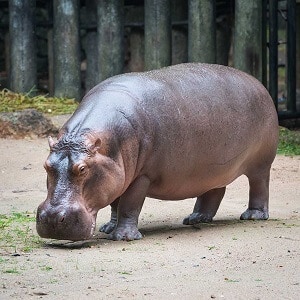
- Scientific Name: Hippopotamus amphibius
- Plural: Hippopotami or Hippopotamuses
- Classification: Mammals
- Life Cycle: Born in water, they stay with their mothers for 8 weeks, before becoming independent
- Habitat: Rivers, lakes, and mangrove swamps in Africa
- Diet: Grass
- Size: Up to 5 feet in height
- Weight: 2,900 to 3,300 pounds
- Symbolism: Strength and power
- Conservation Status: Vulnerable, but are the most dangerous animals in Africa
- Ancestry: Hippopotami Are Related to Whales and Dolphins
- Reputation: Hippos Are the Deadliest Land Animal in Africa
- Habits: Hippos Cannot Breathe Water
- Weakness: Hippos are Terrible Swimmers
- Speed: Hippos Can Reach Speeds of Almost 20 Miles per Hour
- Physiology: Hippos can Open Their Mouths Wider than Their Heads
- Peculiarity: Hippos Rarely Use Their Fangs
- Defenses: Hippos Have the Strongest Bite
- Peculiarity: Hippos Sweat Blood
- Social Structure: Hippos Have a Complex Society
- Hippos Practice Sexual Segregation
- Hippos May Have a Vocal Language
- Hippos Frequently Attack Crocodiles
- Male Hippos Sometimes Eat Their Young
- Hippos Are Born Swimmers
Hippopotamus Facts Infographics

Hippopotami Are Related to Whales and Dolphins

The first of our hippopotamus facts is that, while they might resemble giant pigs, they’re actually related to cetacaeans, which are aquatic creatures. According to genetic evidence, they had a common ancestor with whales and dolphins some 60 million years ago, while the earliest land hippos are believed to have walked in Africa around 16 million years ago. Hippos are among the biggest land mammals in the world, which is why they’re associated with power and strength in some African cultures.
Hippos Are the Deadliest Land Animal in Africa
One of our hippopotamus facts that is little-known outside of Africa involves how the locals actually perceive these animals. Though lions are deadly, most Africans fear hippos more. This is because more people die as a result of hippo attacks than they do from attacks by any other creatures, even snakes. Hippos are generally peaceful, but they are unpredictable, can run fast, and are very heavy. They even attack boats, and sometimes attack people on land, even when they’re in cars. They’re also extremely territorial in water, which helps explain why they attack boats. Fortunately, they’re less territorial on land.
Hippos Cannot Breathe Water
Although they spend half their lives in water, they can’t actually breathe it. Without air, they’d drown, which is why their noses are located on top of their snouts – to keep them above water. They often prefer water to land as it allows them to cool off, though they also enjoy being in mud. Hippos also mate, give birth, and use the toilet in water. While somewhat sociable in water, they tend to be solitary on land where they graze on grass.
Hippos are Terrible Swimmers

Not only can they not breathe water, but hippos cannot actually swim, nor can they float. They’re far too heavy. They move through water by walking on their webbed feet, which is why they live only in shallow water. Their legs are small compared to their bodies because in water, their buoyancy reduces the weight on their legs and feet. When moving through deeper waters, they kick at the ground, allowing them to hop in powerful leaps until they reach shallower areas.
Hippos Can Reach Speeds of Almost 20 Miles per Hour
One of our well-known hippopotamus facts is that while they are generally slow and languid, they can move very fast in short bursts. They can run as fast as 18.5 miles per hour on level ground, and even faster when moving downhill. In water, their powerful legs and lighter weight make them go faster, especially when they kick against the bottom. Though they can’t climb, they can use this burst of speed to move up steep banks toward higher ground.
Hippos can Open Their Mouths Wider than Their Heads
A hippo’s jaw is not like that of other animals. In fact, few other creatures can open their mouths as wide as hippos – which can be wider than their faces. They can do this because their jaw hinges are located so far back into their skulls that they can open their mouths almost 180°. This means that if you face a hippo and it opens those jaws fully, you will no longer see its face; only its lips, teeth, and throat.
Hippos Rarely Use Their Fangs

Hippo teeth are distributed like ours, with an over and under bite, as well as molars. Their canines, however, are long, thick fangs which can grow to as long as 1’ 6″. Despite this, they rarely use them. Those impressive canines are only for combat or to scare others off. Hippos prefer to chew with their molars (their side teeth) and use their lips to grab and pull at grass. Their teeth are always growing and are continuously sharpened as they chew.
Hippos Have the Strongest Bite
Another reason hippos are so deadly is because of the force of their bite. A female’s bite can produce 8,100 newtons of force, which means they can easily break through wood or dent metal. This is yet another reason why being on a boat won’t necessarily protect you from these deadly creatures if they decide to attack. It is not yet known how strong a male’s bite is because they’re too deadly, as far as zoologists are concerned, but anecdotal evidence suggests that male bites are far stronger than those of females.
Hippos Sweat Blood
Well, they don’t actually, but many people think they do because of pictures they’ve seen. Another of our little-known hippopotamus facts is that this so-called blood-sweat is not actually blood. Hippos need to keep their skin moisturized, but they sometimes have to travel far from water in order to find grass to eat. When they stay away too long, their skin secretes a clear liquid that turns red-orange before it turns brown. This fluid protects them from bacteria and reflects sunlight, acting as a sunscreen, a moisturizer, and as a disinfectant.
Hippos Have a Complex Society
Did you know that the plural of hippopotamus is “hippopotami” or “hippopotamuses”? Most of them live in groups called a pod. Despite this, they do not actually form permanent social bonds except between mothers and daughters, and between mothers and their nursing children. A dominant male, called a bull, usually considers a stretch of water to be his; this area can contain about 10 females. Other, younger males are allowed to be there as long as they’re submissive to the bull.
Hippos Practice Sexual Segregation
Except during mating season, which takes place in the dry season from October to March, hippos segregate themselves according to gender and age. Females and their nursing young will stick to one side, while the males will stick to the other. Only the bull usually stays apart from both. Except for nursing mothers, however, their behavior changes on land. There, they suddenly transform into loners. Because of this, no one is sure why they tend to clump together in water.
Hippos May Have a Vocal Language
One of the most commonly known hippopotamus facts is that they have a verbal language, or so many locals insist. They get this impression because hippos bellow, grunt, and growl at each other as if engaged in actual conversations. While this idea of a hippo language was long ago dismissed as a legend, recent studies are beginning to suggest there may actually be some truth to it after all. Some scientists are warming up to the idea that hippos may have a far more complex language beyond “go away”, “danger”, and “ouch”, which most animals can convey.
Hippos Frequently Attack Crocodiles

Although crocodiles are considered to be extremely dangerous creatures, they stand very little chances against a full-grown adult hippo. Another of the commonly accepted hippopotamus facts among locals is that hippos frequently attack crocodiles. Since both species occupy the same watering holes, it’s possible that hippos dislike the thought of sharing their home with crocodiles. Another possible reason for the attacks is that while adult hippos are formidable creatures, baby hippos are vulnerable and are sometimes attacked by crocodiles.
Male Hippos Sometimes Eat Their Young
Perhaps the least-known and least palatable of our hippopotamus facts is that they sometimes turn on their own children. Males have been seen to kill and eat their young, but no one is sure why. Some suggest it’s to decrease their population when there’s too many of them. Others believe it only happens when fathers are unsure if the children are theirs. This could be a possible explanation for why female hippos prefer to segregate themselves from males.
Hippos Are Born Swimmers
Hippos may seem clunky and ungraceful on land, but in water, they’re another thing entirely. Baby hippos can even swim as soon as they’re born. After three weeks, babies even have the strength to climb onto their mothers’ backs to nap and to munch on grass. They won’t leave their mothers until they reach the age of seven to eight weeks, however, after which they are on their own. If they are male, they will no longer associate with their own mothers upon reaching maturity.
Hippopotamus Facts – Facts about Hippopotami Summary
 Hippos may be slow and lumbering creatures on land, but they can move fast when they need to. As such, they are considered to be one of the most dangerous animals in Africa, feared even more than lions, crocodiles, and snakes. Though they stay in groups, they are not really social creatures except when it comes to mothers and their children. And while they’re semi-aquatic creatures, hippos don’t actually breathe water, swim, or float. They simply walk on the ground while buoyed by water.
Hippos may be slow and lumbering creatures on land, but they can move fast when they need to. As such, they are considered to be one of the most dangerous animals in Africa, feared even more than lions, crocodiles, and snakes. Though they stay in groups, they are not really social creatures except when it comes to mothers and their children. And while they’re semi-aquatic creatures, hippos don’t actually breathe water, swim, or float. They simply walk on the ground while buoyed by water.
Was this page helpful?
Our commitment to delivering trustworthy and engaging content is at the heart of what we do. Each fact on our site is contributed by real users like you, bringing a wealth of diverse insights and information. To ensure the highest standards of accuracy and reliability, our dedicated editors meticulously review each submission. This process guarantees that the facts we share are not only fascinating but also credible. Trust in our commitment to quality and authenticity as you explore and learn with us.
